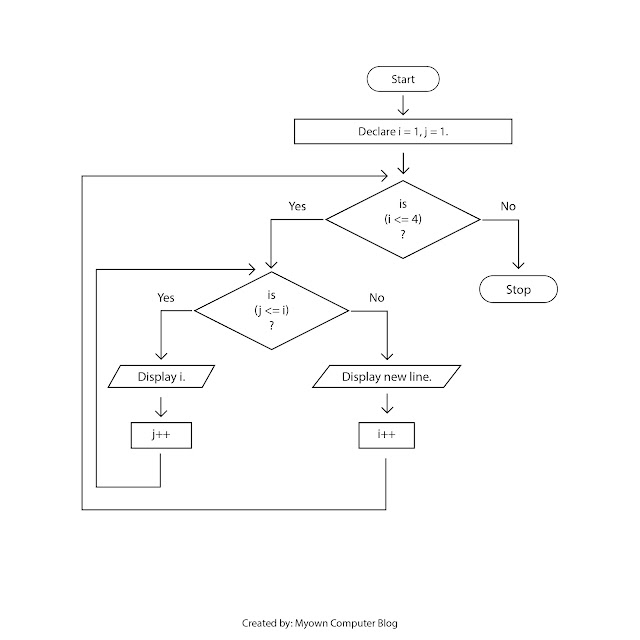37: W.A.P. to display each of the following patterns
Please follow me for more practicals....
Program (A):
#include <stdio.h>
#include <conio.h>
void main()
{
clrscr();
for (int i = 1; i <= 4; i++) {
for (int j = 1; j <= i; j++)
{
printf("*");
}
printf("\n");
}
getch();
}
Please follow me for more practicals....
Output (A):
*
**
***
****
Please follow me for more practicals....
Algorithm (A):
1.
START
2.
Declare i = 1, j = 1.
3.
Repeat upto step-8 until i <= 4.
4.
Repeat upto step-6 until j <= i.
5.
Display *.
6.
j++.
7.
Display new line (\n).
8.
i++.
9.
STOP.
Please follow me for more practicals....
Flowchart (A):
Please follow me for more practicals....
Program (B):
#include <stdio.h>
#include <conio.h>
void main() {
clrscr();
for (int i = 1; i <= 4; i++) {
for (int j = 4; j >= i; j--)
{
printf("
");
}
for (int k = 1; k <= i; k++)
{
printf("*
");
}
printf("\n");
}
getch();
}
Please follow me for more practicals....
Output (B):
*
* *
* *
*
* * *
*
Please follow me for more practicals....
Algorithm (B):
1.
START
2.
Declare i = 1, j = 4, k = 1.
3.
Repeat upto step-11 until i <= 4.
4.
Repeat upto step-6 until j >= i.
5.
Display Space.
6.
j--.
7.
Repeat upto step-9 until k <= i.
8.
Display *.
9.
k++.
10.
Display new line (\n).
11.
i++.
12.
STOP.
Please follow me for more practicals....
Flowchart (B):
Please follow me for more practicals....
Program (C):
#include <stdio.h>
#include <conio.h>
void main()
{
clrscr();
for (int i = 4; i >= 1; i--) {
for (int j = 1; j <= i; j++)
{
printf("*
");
}
printf("\n");
}
getch();
}
Please follow me for more practicals....
Output (C):
* * * *
* * *
* *
*
Please follow me for more practicals....
Algorithm (C):
1.
START
2.
Declare i = 1, j = 5.
3.
Repeat upto step-8 until i <= 4.
4.
Repeat upto step-6 until j >= i.
5.
Display *.
6.
j--.
7.
Display new line (\n).
8.
i++.
9.
STOP.
Please follow me for more practicals....
Flowchart (C):
Please follow me for more practicals....
Program (D):
#include <stdio.h>
#include <conio.h>
void main()
{
clrscr();
for (int i = 4; i >= 1; i--) {
for (int j = 4; j >= i; j--)
{
printf("
");
}
for (int j = 1; j <= i; j++)
{
printf("*
");
}
printf("\n");
}
getch();
}
Please follow me for more practicals....
Output (D):
* * * *
* * *
* *
*
Please follow me for more practicals....
Algorithm (D):
1.
START
2.
Declare i = 4, j = 4, k = 1.
3.
Repeat upto step-11 until i >= 4.
4.
Repeat upto step-6 until j >= i.
5.
Display Space.
6.
j--.
7.
Repeat upto step-9 until k <= i.
8.
Display *.
9.
k++.
10.
Display new line (\n).
11.
i--.
12.
STOP.
Please follow me for more practicals....
Flowchart (D):
Please follow me for more practicals....
Program (E):
#include <stdio.h>
#include <conio.h>
void main()
{
clrscr();
for (int i = 1; i <= 4; i++) {
for (int j = 1; j <= i; j++)
{
printf("%d
", j);
}
printf("\n");
}
getch();
}
Please follow me for more practicals....
Output (E):
1
1 2
1 2 3
1 2 3 4
Please follow me for more practicals....
Algorithm (E):
1.
START
2.
Declare i = 1, j = 1.
3.
Repeat upto step-8 until i <= 4.
4.
Repeat upto step-6 until j <= i.
5.
Display j.
6.
j++.
7.
Display new line (\n).
8.
i++.
9.
STOP.
Please follow me for more practicals....
Flowchart (E):
Program (F):
#include <stdio.h>
#include <conio.h>
void main()
{
clrscr();
for (int i = 1; i <= 4; i++) {
for (int j = 1; j <= i; j++)
{
printf("%d
", i);
}
printf("\n");
}
getch();
}
Please follow me for more practicals....
Output (F):
1
2 2
3 3 3
4 4 4 4
Please follow me for more practicals....
Algorithm (F):
1.
START
2.
Declare i = 1, j = 1.
3.
Repeat upto step-8 until i <= 4.
4.
Repeat upto step-6 until j <= i.
5.
Display i.
6.
j++.
7.
Display new line (\n).
8.
i++.
9.
STOP.
Please follow me for more practicals....
Flowchart (F):













